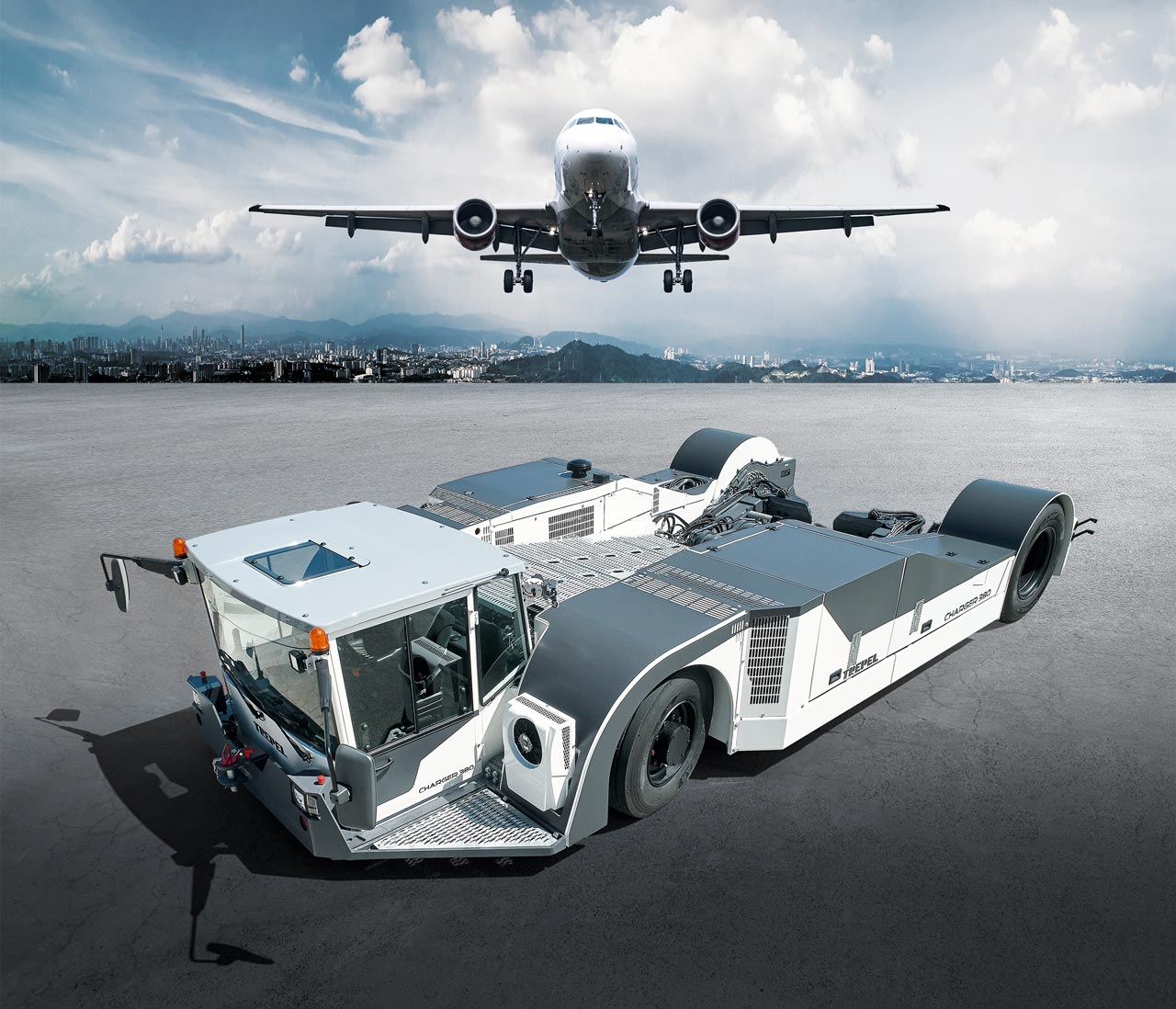TREPEL Airport Equipment is entering the global airport operator markets with an innovation. The new CHARGER 380 aircraft tow tractor with electric drive can claim to offer the most powerful performance package in its class.
“The right product at the right time,” emphasizes Managing Director Roland Hartwig today, Tuesday, 23 July, at the company’s headquarters in Tauberbischofsheim (Baden-Württemberg). The vehicle not only provides valuable services for reducing emissions during flight operations.
The CHARGER 380 was developed in 2020 and the prototypes were then tested intensively in the field. They have been on the market since this year and production is now in full swing. So far, 17 units with three different drives have been sold. The positive feedback has now led TREPEL to raise its sales targets. The aim is to sell 30 e-models by 2025, as they have attracted the most attention. The diesel and hybrid drives will nevertheless remain in the range. “30 units is only five percent of TREPEL’s annual production, but the high performance of the vehicle means that the value retention is significantly higher,” emphasized Managing Director Hartwig.
10 percent more power, 0 emissions
The new aircraft tractor is a real powerhouse. The electric motor has an output of 309 kilowatts, which is around 10 percent more than the most powerful tug currently on the market. This allows the CHARGER 380e to tow up to 380 tons, lift up to 41 tons and develop a speed of up to 32 km/h. This means that the tractor accelerates handling and is therefore more productive.
Speed also plays a role in taxiing, in which the CHARGER 380e brings the aircraft directly to its take-off position, minimizing turbine wear. Another advantage: this saves up to one ton of fuel per operation, depending on the aircraft type. This is exactly what airport operators want: they are looking for possible reductions in CO2 emissions throughout their operations.
High flexibility and more security
In terms of configuration, the CHARGER 380e belongs to the middle of three size classes and can be used very flexibly thanks to its power and towbarless coupling. It is suitable for aircrafts up to the Boeing 777 or Airbus A340-600 type. The towbarless coupling of the tug to the aircraft is the prerequisite for the aforementioned taxiing. The nose wheel is enclosed by two arms that are mounted directly on the tug. This technical solution is also less labor-intensive. Personnel are required in the aircraft and in the tractor, but not on the airfield, as is the case when the aircraft is fixed with a bar between the two vehicles.
The CHARGER 380 also places great emphasis on safety and ergonomics. The vehicle cabin offers more space and the fully swiveling seat allows the driver to adopt an ergonomic posture in every operating mode. There is no longer any handling outside the vehicle, as is the case with bar tractors.
Strong contribution to the low-emission airport
The CHARGER 380e has already attracted the attention of airport operators. According to the klimaschutz-protection-portal.aero of the German Aviation Association, German airports have saved around 20 percent of their emissions by 2019. “But they need to make further reductions in order not to jeopardize the number of take-offs and landings,” explained Roland Hartwig. Traffic on the apron is one of the starting points – and so are the aircraft tugs. “A CHARGER 380e makes a double contribution to reducing emissions. The aircraft are in operation less on the airfield and the tugs no longer produce any emissions during their missions.”
Power supply to airports must be expanded
The demand for aircraft tractors with all-electric drive systems is increasing accordingly. Numerous airlines and airport operators have already announced conversion programs. The largest are well in excess of 100 units. “We want to benefit from this with TREPEL,” announced the Managing Director. However, the Achilles heel in the overall system is currently the power supply at the airports. This is because the tugs require more power, and the current voltage level is usually 80 volts. However, Hartwig reported that 600 to 800 volts would be best for the vehicles with new battery systems. Investments are needed here quickly.
For further information
Julian Großkinsky, Business Development Manager
MAFI Transport-Systeme GmbH, Hochhäuser Straße 18, 97941 Tauberbischofsheim
Phone: +49 9341 899 209, E-Mail: julian.grosskinsky@mafi.de
Sales
Hochhäuser Straße 18
97941 Tauberbischofsheim
Germany
Customer Service
Hochhäuser Straße 18
97941 Tauberbischofsheim
Germany
Representatives
Find your service partner
We have a network of more than 60 partners worldwide to support you in your procurement, service and maintenance tasks. Please take a look here to find one close to your location.

